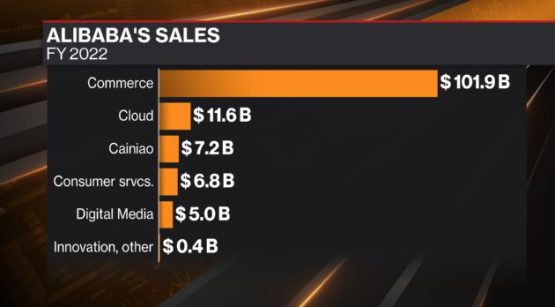Alibaba Group Holding is splitting its $220 billion empire into six business units as part of a massive restructuring that will free up its various divisions to operate with far greater autonomy.
Read all our Alibaba coverage here.
Here is a look at Alibaba’s main businesses and what they do:
Global e-commerce
Alibaba.com is used by merchants around the world looking to sell their goods both domestically and internationally. According to the company’s website, it has a reach of more than 10 million active buyers in over 200 countries and regions.
In the year ended March 31, 2022, the company said more than 40 million buyers from over 190 countries sourced business opportunities or completed transactions on Alibaba.com.
The division also includes: AliExpress, a marketplace that’s popular in the US, Brazil, France and Spain; Lazada, an e-commerce platform in Southeast Asia; and Trendyol, an online shopping service in Turkey.
The cloud
Alibaba Cloud provides cloud computing, artificial intelligence and other data-processing services to thousands of businesses, developers and government organisations in more than 200 countries and regions. It holds the largest market share in China and across Asia, according to the division’s website.
The company has worked to distinguish itself from other cloud businesses by pointing out that it was “born and raised in China” so it understands the complexities of the market there.
Group Chief Executive Officer Daniel Zhang will head up Alibaba’s cloud intelligence division, a nod to the growing role that artificial intelligence will play in the e-commerce leader’s portfolio in the long run. (But he will also continue to run the parent company.)
Alibaba also owns DingTalk, a digital workplace and application development platform used by businesses to collaborate and work remotely.
China commerce
Established in 2003, Taobao is a Chinese online shopping website that allows people to interact with each other and their preferred merchants through features such as livestreaming and short-form videos. Merchants on Taobao are primarily individuals and small businesses. It was China’s largest digital retail platform in terms of gross merchandise value in the year ended March 31, 2022, according to Alibaba, citing Analysys.
Among Alibaba’s other Chinese commerce businesses: Tmall, which caters to consumers looking for high-end, premium products; Idle Fish, a consumer-to-consumer marketplace for second-hand, recycled, for-rent and other products; and Freshippo, a retail grocery chain.
Cainiao logistics
Cainiao is Alibaba’s logistics arm. It has a goal of fulfilling consumer orders within 24 hours in China and within 72 hours anywhere else in the world through a worldwide fulfilment network.
As of last year, the company was running nine overseas sorting centres and had partnerships with more than 500 logistics firms for fulfillments services.
Local services
Ele.me — which translates to “Are you hungry?” — is an on-demand delivery platform in China, enabling consumers to use mobile apps to order meals, food, groceries, flowers and other products. The division also includes Amap, a mobile map, navigation and real-time traffic information provider in China, and Fliggy, an online travel platform.
Digital media and entertainment
Alibaba owns Youku, a long-form video platform in China where users can search, watch and share video content. It also runs Lingxi Games, which develops and distributes mobile games. And Alibaba Pictures runs a platform for content production and distribution, licensing and commercial management, and cinema ticketing.
The others
Alibaba’s DAMO Academy is a global research programme developing cutting-edge technologies. Its aim is to “integrate and speed up knowledge exchange between science and industry.”
The corporation also owns Tmall Genie, which sells Internet of Things-enabled smart home appliances, including smart speakers, lights and remote controls.
© 2023 Bloomberg

